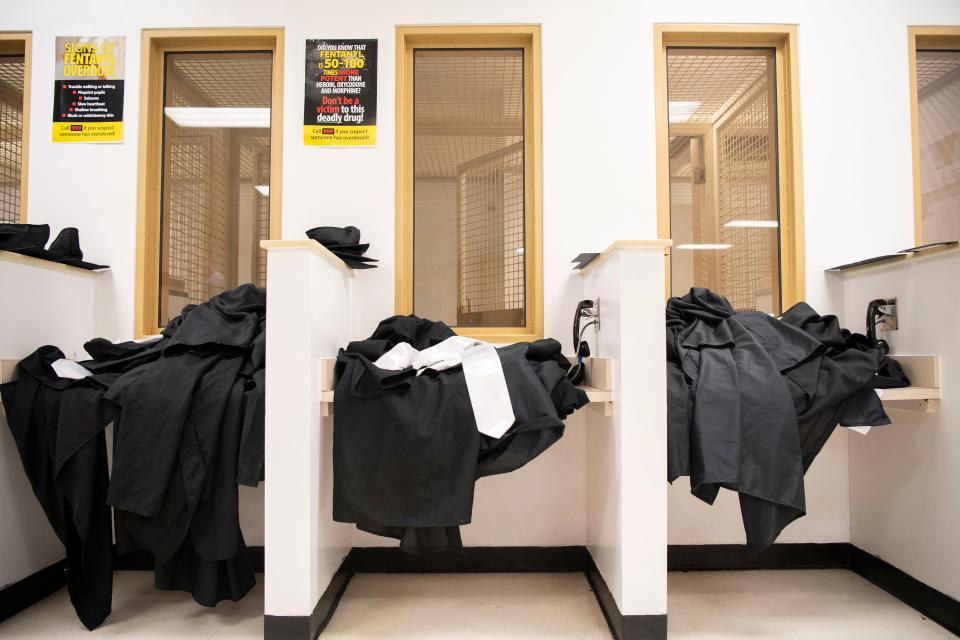Tennessee 'tough on crime' bill will not make us safer and take away from rehabilitation
When our state lawmakers propose laws that aim to be tough on crime, everyone deserves to know the facts about those laws – and what is and isn’t actually tough on crime. While it may seem that longer sentences behind Senate Bill 2044 contribute to public safety, the facts show a different story: This bill disincentivizes rehabilitation, making Tennessee prisons and our communities less safe.
The unfortunate truth about SB 2044 is that it will spur the consequences that excessive sentencing laws are known to create: bloated public spending, wasted law enforcement resources, and higher recidivism rates.
Legislation like SB 2044 does not make Tennessee safer. Rather than addressing the causes of crime or improving the ability to close cases, this bill simply disincentivizes rehabilitation in Tennessee prisons. Tennessee’s earned time credits – and their opportunity to shorten a sentence for eligible people – serve as a vital incentive for incarcerated people to improve their behavior and learn from educational, vocational, and rehabilitative programs, which help the Department of Corrections and improve public safety by encouraging incarcerated people to change their lives.
Public safety is at risk when incentives are weakened
Earned time credits are redirected away from the expiration of a person’s sentence, and instead apply to the person’s parole eligibility date. This amounts to an empty incentive as Tennessee’s parole board denies nearly three-fourths of all applicants, and SB 2044 has given no guarantee for parole grants and no mechanisms for early termination of parole supervision.

Simply put, weakening incentives is bad for public safety. When Arizona eliminated parole and earned time credits in 1993, prison rule violations increased by 50%, enrollment in educational programs dropped by 20%, and the reoffending rate jumped 4.8 percentage points. Tennessee’s prisons are currently severely understaffed. The last thing we should do make Tennessee prisons less safe and make life harder for those who live and work in them.
For the roughly 25% of people who do get an earlier parole, they will still need to spend the remainder of their sentence under parole supervision. That means expending additional resources from Tennessee’s parole officers and numerous pitfalls for returning citizens to manage as they try to successfully reintegrate to their communities and the workforce.
Research shows that most reoffending occurs within the first two years of parole supervision -- leaving periods of supervision beyond that more an hindrance than a meaningful public safety policy. Someone who has shown a commitment to reentry and successful adherence to the rules should be able to earn their way off of supervision. SB 2044 prevents that.
More: Incarcerated men find 'new beginning' at Tennessee prison's first addiction program
Tennessee lawmakers knew this bill would cost a lot in the future
SB 2044 is especially tough on taxpayers. Outside of Medicaid, incarceration costs have been the second-fastest growing budget item for most states in recent years, and this bill adds to those costs.
The fiscal note for this bill indicates “significant increases in state expenditures to accommodate longer incarceration times and parolees being supervised for longer periods of time.” The Fiscal Review Committee reiterated the substantial cost at the Senate Finance, Ways, and Means Committee Hearing last month.
While the exact future cost from this bill is unknown, it amounts to a signed invoice to taxpayers to fund something that will have enormous cost and will negatively impact Tennessee prisons with no proven benefit to public safety.
Public safety should be a top priority for Tennessee, along with proper treatment of law enforcement and of taxpayers. We must incentivize rehabilitation. While SB 2044 aims to provide public benefit, it fails to meet the mark.

Matthew Charles, of Nashville, is a criminal justice expert and Senior Policy Advisor of FAMM.
This article originally appeared on Nashville Tennessean: Tennessee will not be any safer with 'tough on crime' bill

